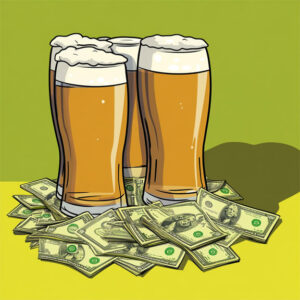 Supporters of prohibition argued that it would solve the ills caused by alcohol. Ironically, prohibition ushered in more evils, such as creating a financial foundation for organized crime. While they were right about the ills of alcohol, their solution was mistaken.
Supporters of prohibition argued that it would solve the ills caused by alcohol. Ironically, prohibition ushered in more evils, such as creating a financial foundation for organized crime. While they were right about the ills of alcohol, their solution was mistaken.
Studies of alcohol use back up the intuitive view that it contributes to the frequency and severity of violence, especially domestic violence. It is also linked to child abuse, suicide and (obviously) drunk driving. While there is neither a necessary nor sufficient link between alcohol and violence, there is a causal connection. As such, reducing alcohol consumption would reduce these harms, providing a basis for a solid utilitarian moral argument for doing so. Since a return to prohibition is not an option and individual efforts are limited to individuals, something with broad reach is needed to have a significant impact on the problem.
While few would argue for a return to prohibition, there is support for raising taxes on alcohol. Intuitively, increasing the cost of a product will reduce its consumption, but intuitions can be wrong. However, numerous studies establish a link between raising alcohol taxes and reducing consumption. This, in turn, helped reduce violence. It also had other unexpected positive effects, such as reducing the number of gonorrhea cases. Raising taxes (and thus prices) is also supposed to reduce teen drinking, lowering the chances they will grow up to become heavy drinkers. These are all significant benefits which can be used in a utilitarian argument in favor of raising alcohol taxes. Naturally, the possible negative consequences must also be considered.
One concern is that if alcohol taxes are raised, people will turn to more dangerous alternatives such as other drugs and “boot leg” alcohol. The worry is that this “solution” will make things worse. But even if some people did turn to more dangerous alternatives, there could still be an overall positive outcome. This is an empirical matter that will require evidence to resolve, and the challenge is raising the tax enough to reduce alcohol consumption but not so much that people start switching to worse drugs or drinking Sterno.
As with any tax on a popular product, it is likely to disproportionally impact people with lower income. This concern has two main moral components. The first is that such a tax would be unfair because of this disproportionality. In this it does not differ from other sales taxes. While everyone pays the same rate, it is a higher percentage of the income of the less well off, which is why progressive taxes are fairer than sales taxes.
The second is that the higher cost would hurt poor people more than the wealthy (which is always true of any such tax). If they keep buying alcohol, they will suffer a greater financial burden, and this could cause additional problems. But if they decide to spend the same as before and thus drink less, then the overall impact would be positive (assuming there are benefits to less alcohol consumption).
There is also ideological opposition to increasing taxes, even (or especially) for the public good. In this case, it could be contended that increasing taxes is simply wrong, even to create good results. While there are some whose opposition to increasing taxes is absolute, it is difficult to argue that it is worse to not raise taxes and tolerate the serious harms, than to raise taxes to create significant benefits. This is why those who oppose tax increases aimed at the public good endeavor to shift the debate from the public good to well-worn ideological sayings about taxes being bad.
One last concern is opposition to the “nanny state.” The idea is people should be responsible for their own choices and the state should not be a “nanny” regulating behavior (except behavior one wants to regulate, of course). An obvious response is that while raising taxes can influence people’s choices, it neither compels nor forbids them in that they are still free to decide about drinking; it will simply cost them more to drink.
It could be objected that the state is still trying to influence behavior in a desired direction. This cannot be denied. But this is what states, by their very nature, do. For example, states impose penalties for things like theft in the hope of changing behavior. Influencing behavior through penalties and imposed costs is what states do. As such, the state trying to reduce alcohol related deaths by raising taxes is as justified as the state trying to reduce murders or illegal border crossing by imposing penalties on those behaviors. As such, increasing alcohol taxes would appear to be the right thing to do.
